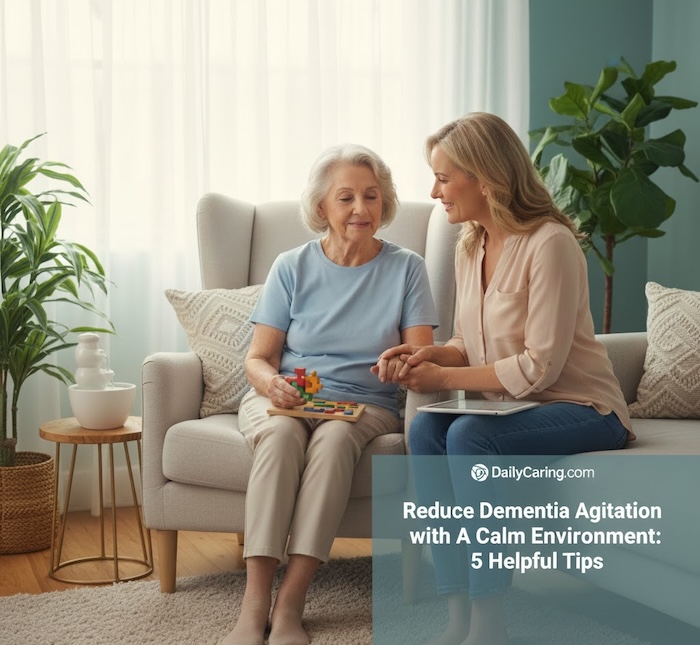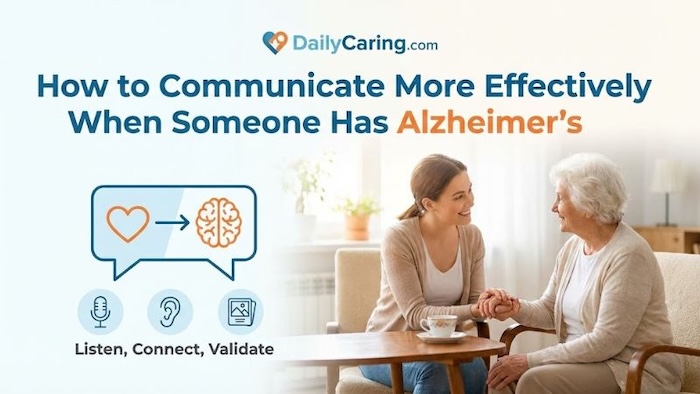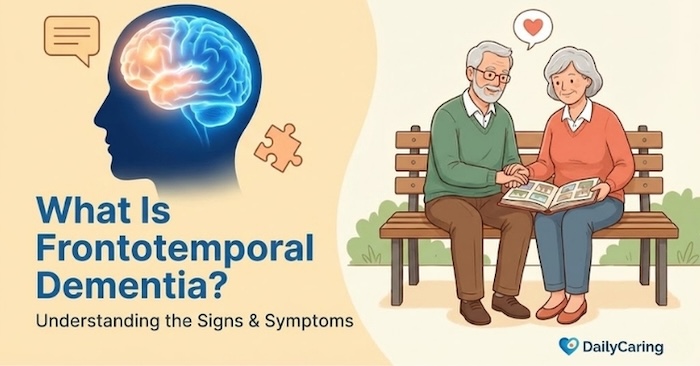Dementia causes changes in the brain that may cause someone to hallucinate – To see, hear, feel, or taste something that isn’t there. Their brain is distorting or misinterpreting the senses. With any hallucination, what’s most important is to validate your loved one's experience, respond to their feelings, and keep them safe.
We share 10 ways to respond when someone with dementia is experiencing hallucinations.

Dementia Can Cause Hallucinations
Even if it’s not real, a hallucination can be very real to the person experiencing this sensation.
For example, if your older adult sees bugs crawling on the floor, nothing you say will convince them that the bugs don’t exist. Their brains are telling them the bugs are real.
Some hallucinations can be scary, but others might involve visions of ordinary people, situations, or objects from the past.
Some may even be pleasant or happy.
These dementia hallucinations usually happen in the middle or later stages and are more common in Lewy Body and Parkinson’s dementia.
But they can also happen in Alzheimer’s disease and other types of dementia.
10 Ways to Respond When Someone is Experiencing Dementia Hallucinations
1. Determine if a response is needed
The first step is determining whether the hallucination is bothering your older adult.
You might not want to respond or call attention if it's pleasant.
Just know and accept that it’s a dementia symptom and thankfully isn’t causing distress.
If the hallucination is upsetting them or causing them to do something unsafe, it’s time to quickly intervene to provide comfort or redirect them to a safe activity.
2. Stay calm and don’t argue with them
When someone is having a dementia hallucination, it’s essential to stay calm and avoid contradicting them.
What they’re seeing is a dementia symptom and is very real to them.
Trying to explain that it isn’t real won’t work because of the damage that dementia has caused in their brain.
Knowing that you don’t believe them might make them even more upset.
If they’re calm enough to explain, it may also help to understand what they’re seeing. Listen carefully and try to pick up clues.
However, keep in mind that dementia can damage the brain, potentially affecting the person's ability to use the correct words. For example, they could unintentionally say ‘cabbages' when they mean ‘green cushions'.
3. Validate their feelings and provide reassurance
Be careful not to dismiss your older adult’s experience.
Brushing off what they see by saying something like, “Don’t be silly, there’s nothing there,” will likely upset them.
It helps them talk about what they’re seeing. Having you take them seriously and provide reassurance increases their feeling of safety and security.
Focus on being kind and responding to their feelings rather than the hallucination itself.
If they’re scared, you could say, “That sounds scary. I can see how upset you are.”
If they’re happy, you might say, “How wonderful! I’m glad that makes you so happy.”
Other possible responses could be, “It sounds like you're worried,” or “I know this is scary for you.”
You don’t need to pretend that you can see or hear what they can; just be supportive and do what you can to relieve any fear or anxiety as if it were a real threat.
For example, you could say,” I don’t hear or see anyone outside the window, but you seem worried. What can I do to help you feel safe?“
4. Check the environment and remove possible triggers
Oftentimes, dementia hallucinations can be triggered by things going on around an older adult.
Their dementia brain can interpret sights and sounds differently, causing hallucinations.
To remove possible triggers, check their environment for background noise or visual stimulation that could cause a problem.
For example, things like a TV or radio could make them believe that strangers are in the house, what’s happening on TV is real, or that they’re hearing voices.
Dim lighting could make shadowy corners a source of fear.
Reflections in shiny floors or windows, when it’s dark outside and bright inside, can make it seem like people are in the house.
Similarly, mirrors can be another source of fear or confusion.
VIDEO: Responding to Dementia Hallucinations in Seniors
5. Offer simple answers and reassurances
When someone is having a dementia hallucination, don’t give lengthy explanations about what’s happening. Trying to process what you’re saying may add to their distress.
Instead, respond calmly and supportively.
You could say something like, “I'm here to protect you. I'll make sure you’re safe. Everything is ok.”
Gently hugging or patting their arm or shoulder may also provide the comfort and reassurance they need if they’re scared or stressed.
Connecting with you may also be a welcome distraction from the hallucination.
6. Look for patterns
If hallucinations happen frequently, there could be a trigger that’s not obvious.
One way to determine what is causing the behavior is to track activities and look for a pattern.
Taking notes or keeping a dementia journal may help you discover that certain hallucinations happen at a particular time of day, before or after meals, or are related to a physical need like using the bathroom or being in pain.
Or, it could be something as simple as a change in daily routine that’s making them feel confused or disoriented and causing hallucinations.
Keeping a log or taking notes helps you look for solutions and ways to avoid the situations that may be triggering hallucinations.
7. Distract and redirect
Another effective technique is to distract your older adult from their hallucination.
Try to switch their focus to an activity they enjoy.
You could ask them to help you with a chore that makes them feel successful, look at favorite family photos, sing their favorite song, do a fun puzzle, eat a tasty snack, or take a pleasant stroll to look at the view – even an indoor stroll would work.
Another way to distract is to direct their attention to you instead of the hallucination.
If they’re hearing voices, try chatting with them. Hearing those voices is harder if you’re now conversing with them.
Or if they’re seeing someone or something, get to eye level and try to make eye contact. If they’re occupied with looking at you, it could make the hallucination less intense or even fade away.
8. Get support to help you cope
Caring for someone with dementia's hallucinations is stressful. So it can be a big help to know that you’re not alone in dealing with issues like this.
That’s why caregiver support groups are highly recommended.
Sharing your experience and getting advice and tips from others can make life easier.
Many great online groups are free and private. Here are 11 that we recommend.
9. Talk with the doctor to find out if there are medical causes
You may want to speak with your older adult’s doctor to find out if there could be a medical reason behind their hallucination.
This wouldn’t change your response, but it may help you find ways to reduce or eliminate the behavior.
For example, some medical issues that can cause hallucinations include dehydration, urinary tract infections, kidney or bladder infections, head injuries from a fall, or pain.
Or if your older adult recently started a new medication, it could be a negative side effect of the drug or an interaction with another medication. Immediately report any changes in their behavior to the doctor.
If you're an adult experiencing hearing or vision problems, that could easily explain why you are seeing or hearing things that aren’t there.
10. Contact the doctor immediately if their safety or yours is at risk
If your older adult is severely distressed by hallucinations or if hallucinations cause them to hurt themselves or others, contact their doctor immediately to get help.
For example, they may be hitting out to defend themselves against a perceived attacker, running away from something that scares them, or avoiding something else dangerous.
These types of actions can easily lead to injury to them and you.
When you speak with their doctor, describe the symptoms, how often they happen, and if they’ve changed in intensity or frequency over time.
It helps if you’ve kept a log or notes that could help the doctor get a clearer picture of what’s happening.
If non-drug approaches aren’t working and there isn’t a medical condition that’s causing hallucinations, careful use of behavioral medication could improve the quality of life by reducing the intensity and frequency of hallucinations.
Conclusion:
Navigating dementia hallucinations requires immense patience, empathy, and a shift in perspective. Remember, the goal is not to correct their reality, but to join them in it with compassion and seek the comfort behind the fear.
By responding with reassurance, simplifying their environment, and working closely with their doctor, you can transform moments of distress into opportunities for connection and peace. You are not just managing symptoms, you are honoring your loved one's experience and providing the profound gift of feeling safe and understood.
For more expert guidance, explore our related articles on communication and behavior management.
Recommended for you:
- How to Respond to Dementia Delusions: Abuse, You’re a Stranger, Someone’s After Me, Bugs Everywhere
- 7 Ways to Reduce Dementia Sundowning Symptoms
- Alzheimer’s and Fear of Being Alone: 5 Ways for Caregivers to Cope
About the Author

Connie is the founder of DailyCaring.com and was a hands-on caregiver for her grandmother for 20 years. (Grandma made it to 101 years old!) She knows how challenging, overwhelming, and all-consuming caring for an older adult can be. She also understands the importance of support, especially in the form of practical solutions, valuable resources, and self-care tips.














My mam thinks people are stealing her money and have come into the room at night she having a conversation with people who are not there and she gets so annoyed picking up the TV control thinkingvits her phone to ring the police its so hard in wht to do my mum has moderate vascular dementia
Hopefully the suggestions in the article above are helpful in managing the hallucinations.
To help improve her sleep and reduce these symptoms and behaviors, these articles might be helpful:
– How to Handle Dementia Behaviors Without Antipsychotic Drugs https://dailycaring.com/how-to-handle-dementia-behaviors-without-antipsychotic-drugs/
– Why a Daily Routine Is Important for Seniors: 3 Top Benefits https://dailycaring.com/why-routine-is-important-for-seniors/
– 5 Types of Medications for Alzheimer’s Behavior: Effectiveness, Benefits, and Risks https://dailycaring.com/5-types-of-medications-for-alzheimers-behavior-effectiveness-benefits-and-risks/
My mother, a rather smart and together person otherwise, sees all sort bugs coming out of her body – her nose, her toes, on her chest in her scalp. Sometimes this has led to self-harm when she scratches too much or puts something on it (fungus powder!) that has led to infection. It’s very sad as when you converse with her and get her off ‘the bugs’ she’s very sharp…but then the ‘bug’ conversation can come up again. She wants to see more and different doctors but there is no cure for her visions. She gets very upset that she can’t see more doctors or be admitted to the hospital. Over the past three months she admitted herself THREE times for extended stays. We finally got her a place in an assisted living facility so that she could be watched more closely. It’s frustrating and sad to see her so frustrated and angry about her situation. She also won’t take medication (anti-anxiety) which could help. She keeps telling us that she isn’t ‘mental or depressed’ ergo why she won’t take the medication. So we all endure her frustrations.
So sorry to hear about this challenging situation. It’s helpful that she’s getting the care and supervision that she needs to stay safe and healthy.
If the doctor feels that trying medication would help, they could help by pretending that the medication is being prescribed for something else (perhaps the bugs) instead of for anxiety, which she won’t accept. Sometimes fibs are necessary to help someone who has impaired judgement due to dementia.
My mom also had hallucinations when she had Alzheimer’s. She also had illusions. I think “ill”usions is an appropriate terms, since Alzheimer’s is an illness, after all. I wrote a book about my husband and I taking care of her called, “My Mother Has Alzheimer’s and My Dog Has Tapeworms: A Caregiver’s Tale.” At first, these hallucinations scared me, but after a while, I was happy that she thought she had friends to talk to.
Lately my mom has been claiming to see both workers who have been working in her home while others have been there and telling other people not to pay attention to them and she has seen “relatives” when no one is there. She refuses to go to the doctor to get help so we can’t get her properly diagnosed, but she is having frequent memory lapses, losing things, becing increasingly paranoid and depressed. She is showing all the signs of dementia and Alzheimers and we are at a loss as to what to do, she gets angry and defensive when we try to help her but is getting rapidly worse.
Hopefully the suggestions in the article above are helpful in managing the hallucinations.
You might want to call her doctor and let them know about your concerns and that she’s unwilling to see the doctor. They might be able to help come up with a reason to get her into the office for a thorough exam and, with your concerns in mind, evaluate her cognitive state.
We also have an extensive section on our website that’s focused on Alzheimer’s and dementia that might be helpful – https://dailycaring.com/category/health-conditions/alzheimers-dementia/
My husband’s grandmother is 90 and she has been seeing people in the house during the day while her daughter is at work. My husband checks on her during the day and the doors are always locked and secured but she has episodes of seeing people in the house that never talk to her but she is afraid they may hurt her. Any advice on what to do to help her would be appreciated.
Hopefully the suggestions in the article above are helpful in managing the hallucinations.
To help reduce these symptoms and behaviors, these articles might be helpful:
– How to Handle Dementia Behaviors Without Antipsychotic Drugs https://dailycaring.com/how-to-handle-dementia-behaviors-without-antipsychotic-drugs/
– Why a Daily Routine Is Important for Seniors: 3 Top Benefits https://dailycaring.com/why-routine-is-important-for-seniors/
– 5 Types of Medications for Alzheimer’s Behavior: Effectiveness, Benefits, and Risks https://dailycaring.com/5-types-of-medications-for-alzheimers-behavior-effectiveness-benefits-and-risks/
My Grandmother is 93 she has dementia. She has been having hallucinations for some time. Lately, they are occurring more at night when she is in bed. She goes to sleep and wakes up or she never gets to sleep and stays up. She is talking, conversing with people who are no longer alive. Mostly relatives or some other people she calls by name who I’ve never heard of. Her Dr prescribed 25 mg of Seroquel which has reduced but not totally eliminated the hallucinations.
Hopefully the suggestions in the article above are helpful in managing the hallucinations.
To help improve her sleep and reduce these symptoms and behaviors, these articles might be helpful:
— How to Handle Dementia Behaviors Without Antipsychotic Drugs https://dailycaring.com/how-to-handle-dementia-behaviors-without-antipsychotic-drugs/
— Why a Daily Routine Is Important for Seniors: 3 Top Benefits https://dailycaring.com/why-routine-is-important-for-seniors/
— 5 Types of Medications for Alzheimer’s Behavior: Effectiveness, Benefits, and Risks https://dailycaring.com/5-types-of-medications-for-alzheimers-behavior-effectiveness-benefits-and-risks/
My mom hears voices, it’s not B12 deficiency, dementia, schizophrenia, she’s had those checked out. Her hearing is really bad. She is very scared and took all of her medications to sleep. She can’t get in to see a psychiatrist for 2 months, she needs help and I dont know what else to do.
It sounds like your mom has been thoroughly examined by doctors and they haven’t yet found a cause for this. Could there be a psychological cause, like stress or fear? Or could it be side effects from her medications?
It might help your mom if you talk gently with her about her experience. Ask open ended questions and encourage her to talk about it. Focus on listening and understanding rather than finding solutions. Learning more might help you better understand what might be causing this to happen and to research possible solutions.
Very helpful.
We’re so glad these suggestions are useful!
My husband was diagnosed of Parkinsons disease 2 years ago, when he was 49. He had a stooped posture, tremors, right arm does not move and also a pulsating feeling in his body.
Hi,
the comments and your responses are helpful. I am 83 and am aware of some of the conditions you describe as mci…feeling overwhelmed by certain sequencing tasks, taking much longer to find the word though I can substitute , usually. I start a sentence and the topic just disappears.
I also do not remember events that I used to think about, unless someone offers a reminder of sorts. Being annoyed has become more common but maybe to do with food lack. “hangry”…mood swings are prevalent.social contacts are not important to me unless family. I often find it difficult to get up and get going and would rather stay in bed. Daily Care is a great resource and I am grateful. JL.
Thanks so much for sharing your thoughts and experience 💜 We’re so glad our articles are helpful.